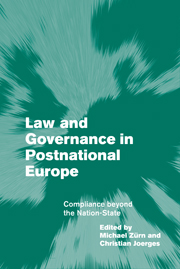Book contents
- Frontmatter
- Contents
- List of tables
- Notes on contributors
- Preface
- 1 Introduction: Law and compliance at different levels
- 2 The analysis of compliance with international rules: Definitions, variables, and methodology
- 3 State aid control at the national, European, and international level
- 4 Domestic limits of supranational law: Comparing compliance with European and international foodstuffs regulations
- 5 Politics of intergovernmental redistribution: Comparing compliance with European and federal redistributive regulations
- 6 Conclusions – the conditions of compliance
- 7 Compliance research in legal perspectives
- References
- Index
6 - Conclusions – the conditions of compliance
Published online by Cambridge University Press: 22 September 2009
- Frontmatter
- Contents
- List of tables
- Notes on contributors
- Preface
- 1 Introduction: Law and compliance at different levels
- 2 The analysis of compliance with international rules: Definitions, variables, and methodology
- 3 State aid control at the national, European, and international level
- 4 Domestic limits of supranational law: Comparing compliance with European and international foodstuffs regulations
- 5 Politics of intergovernmental redistribution: Comparing compliance with European and federal redistributive regulations
- 6 Conclusions – the conditions of compliance
- 7 Compliance research in legal perspectives
- References
- Index
Summary
Is law beyond the nation-state possible? Does compliance in horizontal settings work sufficiently well? What are the building blocks for a successful elicitation of compliance beyond the nation-state? What is special about the EU in this respect? These questions have guided our study. In this chapter we discuss the empirical findings of our study, some lessons in designing institutions to achieve high rates of compliance, and some special features of the EU as a polity. In the first section, we reject the principal hypothesis that reliable law and legal equality can be expected only within a national setting. The next section discusses in detail how different theoretical perspectives on compliance contribute towards understanding successful compliance beyond the nation-state. In addition, we argue that the interactive effects between variables from different theoretical perspectives are decisive in understanding compliance records. Finally, we discuss the practical and theoretical implications of our findings.
The winner is: The EU
The preceding chapters report the findings of three sets of comparisons. In each set, regulations are compared that are located at different political levels but are of very similar content and type. By keeping the policy type and the underlying interest structures more or less constant, we studied the effects of different political settings on rule compliance. Regulations on the control of subsidies have been formulated by the WTO and by the EU as well as within Germany. Redistribution among territorial units is institutionalized in both the EU and Germany.
- Type
- Chapter
- Information
- Law and Governance in Postnational EuropeCompliance Beyond the Nation-State, pp. 183 - 217Publisher: Cambridge University PressPrint publication year: 2005
- 8
- Cited by

